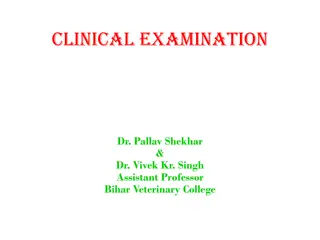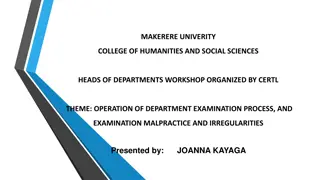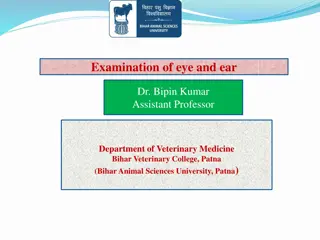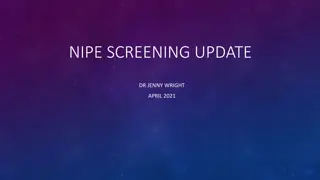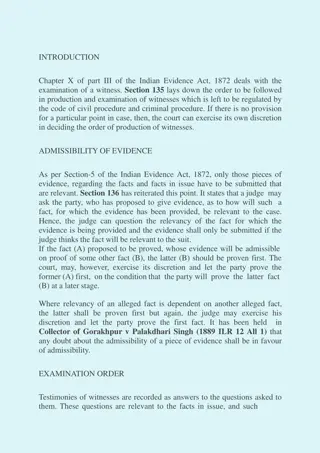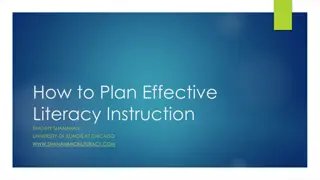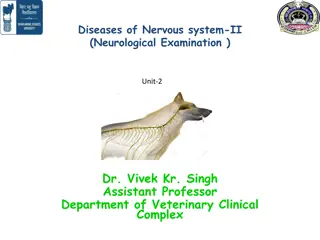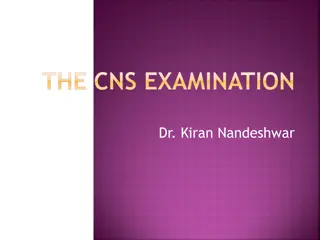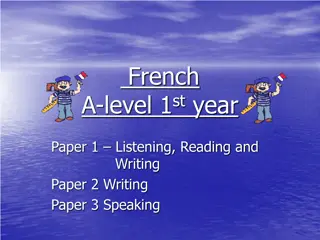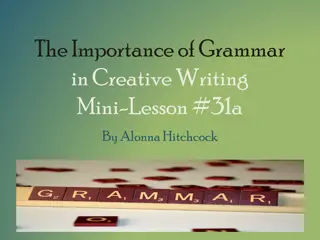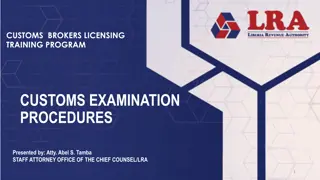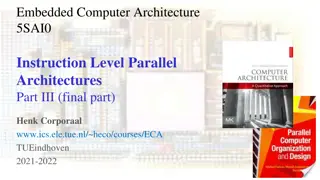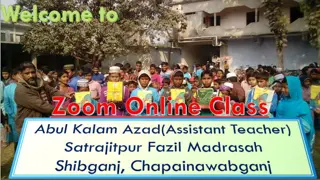Rethinking Grammar in Writing Instruction: A Critical Examination
Challenging traditional views on grammar teaching, this text delves into the misconception of grammar as error, emphasizing the need to reconsider its role as a resource for writing. It explores the contrasting perspectives in the public, professional, and research domains regarding the impact of teaching grammar on writing skills.
Download Presentation

Please find below an Image/Link to download the presentation.
The content on the website is provided AS IS for your information and personal use only. It may not be sold, licensed, or shared on other websites without obtaining consent from the author. Download presentation by click this link. If you encounter any issues during the download, it is possible that the publisher has removed the file from their server.
E N D
Presentation Transcript
Not Errors and Abominations: Rethinking Grammar as a Resource for Writing Debra Myhill
The Error Fallacy A desire to rid children of the evil habits of speech contracted in home and street (Newbolt 1921) the traditional view of language teaching was, and indeed in many schools still is, prescriptive. It identified a set of correct forms and prescribed that these should be taught (Bullock1975) Grammar is error and error is grammar in much of the public mind. (Hancock 2009) Grammar suffers the misfortune of being associated with the negative, the corrective, the inevitable remedial half of English teaching (Keith 1990) 3
The Public View SYNTAX TOO TAXING FOR TEACHERS Times Educational Supplement PUPILS NEED LESSONS IN HOW TO SPEAK PROPERLY The Telegraph Teaching children about syntax and the parts of speech will result in better writing, as well as making them politer, more patriotic and less likely to become pregnant (Pullman 2005). 4
The Professional Position English teachers do not see themselves as grammar police, on the lookout for mistakes (NCTE 2006). For most people, nothing helps their writing so much as learning to ignore grammar (Elbow 1981) A professional tendency to counter-point grammar and creativity Professional beliefs continuum: from grammar as accuracy, to grammar as unhelpful, to grammar as damaging. Alternative view: that knowledge about language is an entitlement, a tool for talking about language 5
Reprise: grammar - a contested area Public/political view of grammar: error, accuracy and (moral) standards Professional view of grammar: Teaching grammar is pointless, even damaging Teaching grammar has no impact on students writing Teaching grammar is a valuable part of knowledge about language Research on grammar: Repeated studies showing no evidence of impact on writing No studies which investigated teaching grammar meaningfully in context of writing instruction No studies conducted in the UK educational context
The Research Design RCT Cluster trial + Qualitative Study Three year study with one year intervention Better understanding of what, how and why grammar teaching works ?
The sample 32 schools from the South-West and the Midlands Random selection using LA school lists and random number generator One year 8 class (12-13 year olds) in each school as the student sample 32 focus students (one per school, stratified by gender) 32 participating teachers (one per school) Teachers undertook a grammar test (LSK) sample divided so that those with strong LSK were evenly divided between groups, then rest of teachers randomly allocated to intervention or comparison group.
The Intervention 3 Schemes of Work designed for the research Each scheme focused on a different written genre: Narrative Fiction; Argument; Poetry. Each scheme written to cover 3 weeks: one scheme taught per term Contextualised grammar teaching embedded into each scheme
Contextualised grammar teaching Introducing grammatical constructions and terminology at a point in the teaching sequence which is relevant to the focus of learning The teaching focus is on effects and constructing meanings, not on the feature or terminology itself The teaching goal is to open up a repertoire of possibilities, not to teach about correct ways of writing.
Key Teaching Strategies The grammatical metalanguage is used but it is always explained through examples and patterns Links are always made between the feature introduced and how it might enhance the writing being tackled The use of imitation : offering model patterns for students to play with and then use in their own writing The inclusion of activities which encouraging talking about language and effects The use of authentic examples from authentic texts The use of activities which support students in making choices and being designers of writing The encouragement of language play, experimentation and games
Contextualised grammar teaching Narrative Fiction: Different effects of using first or third person viewpoints How choice of nouns for setting and characters can convey meanings Argument: How different modal verbs position the argument differently Using short sentences to emphasise key points Poetry: Varying line lengths to create different textual rhythms (linked with sentence variety) Using expanded noun phrases to create picture poems
If in some smothering dreams you too could pace Behind the wagon that we flung him in, And watch the white eyes writhing in his face, His hanging face, like a devil's sick of sin; If you could hear, at every jolt, the blood Come gargling from the froth-corrupted lungs, Obscene as cancer, bitter as the cud Of vile, incurable sores on innocent tongues, My friend, you would not tell with such high zest To children ardent for some desperate glory, The old Lie; Dulce et Decorum est Pro patria mori.
The Results Does contextualised grammar teaching improve children s writing? Yes but the benefit is not across the board. Some students seem to gain more than others.
Comparison v Intervention Statistically significant positive effect for intervention group: E=1.53 Intervention group improved their writing scores by 20% over the year compared with 11% in the comparison group. The grammar teaching had greatest impact on able writers: E= 1.65 The teaching materials supported those teachers with middling linguistic subject knowledge the most. But what does this mean in the classroom?
What the teachers said It is crucial to teach children explicitly how to write well; I think that these schemes of work are proving that, yes it is crucial, because actually, I don t know, before these schemes of work, I mean I would teach them explicitly how to write, but I think these schemes go into a lot more detail than I would ve. They ve definitely picked up quite a lot from it ... I think, if I was teaching this similar sort of module, I don t know if I would ve done it in as much detail... like third person and first person and text based, but actually now that I ve taught it, it s really sort of thrown to light how much they re getting from it ...and how useful it s been and I think it s going to definitely alter my teaching of this type of module again. I don t think I would have been this explicit about it
What the observations revealed A lot of thoughtful discussion about language and writing Good use of models by teachers to prompt thinking about genres Excellent modelling of writing choices by teachers, often using their own writing Adaptation of teaching materials to suit the context and individual needs Clear goal of making connections for students between the grammar being taught and what it might do for the writing
What the students said Students enjoyed the way the teaching materials allowed them to play with language Students talked confidently about choices they were making in their writing Students were very focused on meaning-making, and understanding their audience Students often described language choices without using the metalanguage
Writing Conversations It s going to be told in first person by one of the tramps called Toby and, he s going to be like the one that had something really bad happen to him in his past and that s why he s been made homeless... It s going to be present tense because I think if it s going to be like a diary account then, it will be past at the beginning from like, when he s telling the story of his past but like towards the main bit it will be present, so it will go from past to present.
Writing Conversations We used inclusive pronouns like I, you, we, us, getting you involved in it as well, not just you delivering your speech You re involving the reader, and, saying, we could do this
Writing Conversations The sentence structures are the same, very similar, so like change them around a bit like, make it different you could change it to Ever since they were babies, the older generation have been looking after the younger generation because it starts the sentence differently Maybe they could vary the sentences a little bit more because they are sort of all quite the same At the very very end they could put So let s end this madness full stop, and then put Now because it s very big and it would stick in the reader s mind
Writing Conversations I just subconsciously know that if you put the verb here then it makes it seem more angry or more colloquial or whatever than if you put it in the normal place.
Writing Conversations Help! Frantic cries were coming from the village, the fire was blazing and blistering through the forest, animals crying, leaping, jumping, doing whatever they could to get away, but there s not escape, one by one they are swallowed back into the rampaging fire of doom. Starting to panic the villagers try to get away but there s no escape. I crossed out - it said The villagers are really starting to panic and I changed it around and I put Starting to panic the villagers try to get away ... I prefer the Starting to be at the front, because it didn t really tie in with the story that well, but the second sentence did better, and it describes more in the sentence than that one at the top. I ve exclamation mark to give it emphasis straight and I ve used a lot of describing about the fire. started with an away,
Hollow Metalanguage and I might use a bit of past tense in there but I don t think I would use the past tense all the time because it s quite hard I think I could ve added more sentences or more, more of them words I ve forgotten what they re called now they could ve done bigger paragraphs ... and used more of the modal verbs
Rottweiler Syndrome add in adjectives and like nouns and adverbs and verbs, because ... if you do that then it makes it more interesting because ... it s like describing the words, the sentence better. Instead of just plain words like, I was kicking my legs back and forth , you can say, I was hastily moving my legs back and forth.
But... I think sometimes not having adjectives really works, and not having adverbs just sometimes, sometimes it can make things sound so much better, but sometimes it makes it sound a bit kind of, like you ve tried too hard almost, a bit complicated
Schooled Knowledge Students sometimes picked up grammar messages from teachers which weren t helpful: That some grammar features carry intrinsic merit (eg complex sentences) That grammar is about adding ... more adjectives, more connectives That grammar is about getting better grades
Teacher Grammar Knowledge The teaching materials were most supportive to teachers with average linguistic knowledge. Teachers with less confidence in linguistic knowledge often avoided the grammar element of the intervention because they thought it would be too difficult. Some teachers were very anxious about the grammar. Some teachers found it hard to link the grammar with the writing.
Grammar Subject Knowledge Feelings of fear, anxiety and inadequacy Awareness of never having been taught grammar Anxiety about explanations and student questions
Teachers linguistic knowledge Lack of knowledge leads to lack of confidence I: So what for you is the difference between the terminology of caesura and enjambement as specialist metalanguage and grammatical metalanguage T: because I m more secure with that, than I am with my grammar I: Can I just probe what you said there about the caesura and enjambement and the grammar that you re happy with the caesura and enjambement because you T: I feel more secure with it, yes I don t feel as confident talking about the difference between I mean I know the difference between a complex and a compound and all the rest of it. 31
Teachers views about grammar Positive experiences create more positive views as I m acquiring terminology and becoming better at it and more certain and confident, it does help because, as I tell the kids, they re going to get better marks at GCSE if they can call it an adverb rather than just say using a word, and they are. So I m telling this lot that and they re starting to do it - like last lesson, the boy that was doing the Lyra thing at the back, he said Well, what I ve done is I ve moved the adverbial to the front and, you know, straight away it was just great it s been quite buzzy when they re doing that, and I find that exciting. 32
Grammar and Writing? Teaching grammar is not about obedient adherence to accepted norms but the nurturing of a repertoire which generates infinite possibilities. Teaching grammar shows young writers how to have their way with words: it is explicit. It acknowledges that startling images, arising unbidden from the unconscious, sometimes surprise the writer, that the turn of a sentence in its first draft may be just right, and that through writing we often discover what we want to say. It also recognizes that for most writers, such moments of creative flow are balanced by the hard slog of generating, tuning, and refining our writing. 33
Every line, every phrase, may pass the ordeal of deliberation and deliberate choice. Samuel Taylor Coleridge Conscious manipulation of syntax deepens engagement and releases invention. Ted Hughes
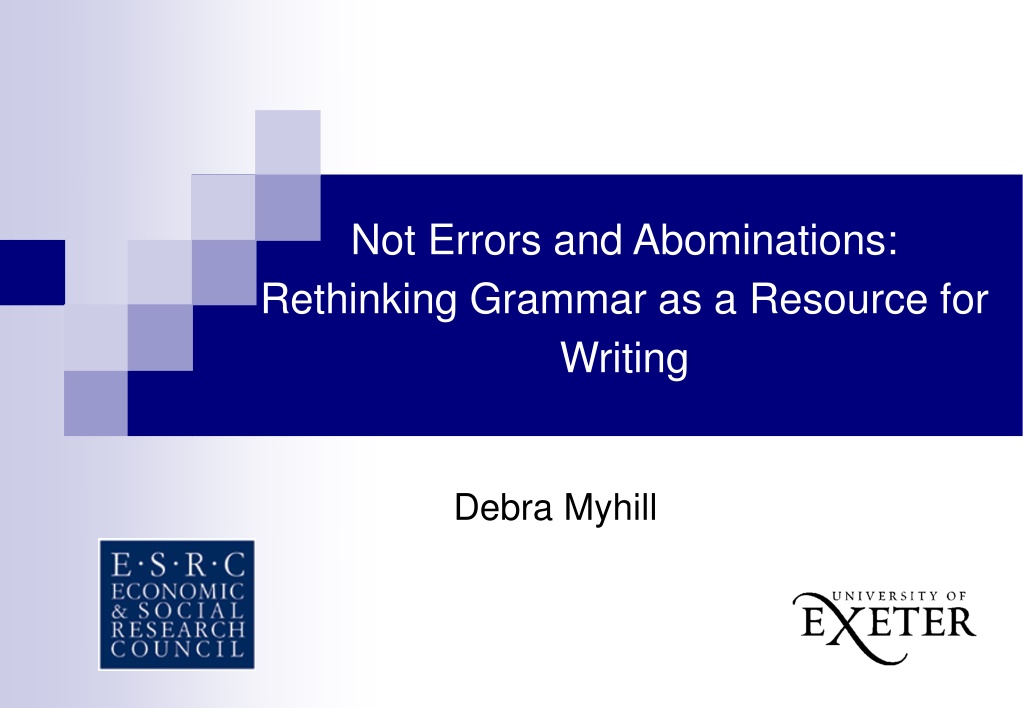
 undefined
undefined










